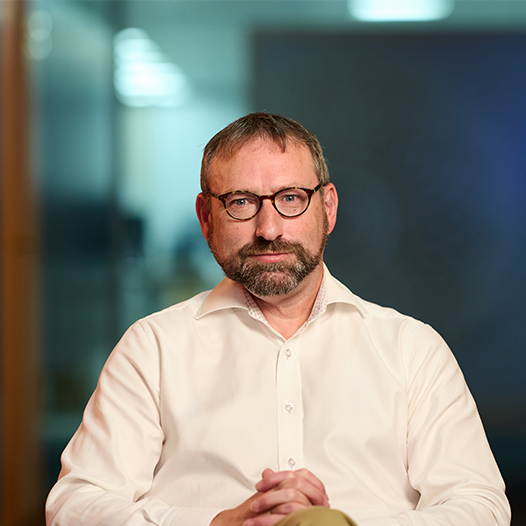Key points
- The shift to passive and low-cost active management risks diluting stewardship and engagement activities
- Long-term wealth creation requires resource-intensive stewardship and engagement from active managers
- Companies with engaged long-term shareholders tend to outperform others, highlighting the importance of proper stewardship and engagement

All investment strategies have the potential for profit and loss, your or your clients’ capital may be at risk.
At the recent DC forum, Stuart Dunbar, a partner at Baillie Gifford, delivered a thought-provoking presentation on the future of wealth creation and the challenges facing listed equity markets.
Dunbar, who is part of Baillie Gifford's strategic priorities group, shared his insights on the shifting landscape of investment and the critical role of active management in ensuring sustainable wealth creation.
The importance of active management
Dunbar began his presentation by addressing the current decline in the effectiveness of listed equity markets in wealth creation.
He suggested that the shift towards passive and low-cost active investing risks the sustainability of stewardship and engagement activity necessary for wealth creation.
"We are effectively moving into ungoverned, ownerless corporations, which has huge implications," Dunbar stated.
He emphasised that the lack of proper stewardship and engagement has the potential to reduce returns for passive and active investors.
Dunbar highlighted the importance of active management and explained that well-resourced active approaches are essential for effective, long-term wealth creation.
He said wealth is created through scientific advances, better business models and productivity growth –producing more output for the same input or using less input for better output.
Where does the capital come from that allows companies to invest to generate that wealth? It is still predominantly within public markets.
Primary cash flows in private markets are dwarfed by the amount companies reinvest within their businesses to create growth in the listed equity markets.
Dunbar criticised the trend of pushing active managers to lower their fees to unsustainable levels, undermining their ability to exercise proper stewardship over the companies they invest in.
He noted, "If we don't do that [stewardship], there is no encouragement and ambition and working with management to invest for the future". This can result in short-term decision-making within companies, management sucking the wealth out for their benefit and not shareholders, or huge forgone opportunities as short-term management for cash flows prevails.
Dunbar also discussed the broader challenges in wealth creation, including misalignments of time horizons and the lack of alignment between management and investors.

The role of stewardship and engagement
Emphasising the role of stewardship and engagement, particularly where companies have significant long-term growth opportunities, Dunbar argued that these activities are essential for ensuring that companies invest for the future.
Drawing upon a study undertaken by the Thinking Ahead Institute and the PRI (Principles for Responsible Investment), "The level of supervision, if you want to call it that, which is being used to supervise the activities of companies in which we invest is at best half what it should be," Dunbar remarked.
He emphasised that effective active management cannot be achieved with minimal resources. Successful companies typically exhibit higher and better research and development spending, rapid organic growth beyond market expectations, a willingness to defy market short-termism (resulting in significant share price drawdowns at times), and strong cash accumulation.
Dunbar stressed that these traits are not forecastable through AI or financial charts; instead, they require direct engagement with company management to understand their alignment and build relationships.
This process is time-consuming and expensive but essential. For example, Baillie Gifford’s investors have spent seven years studying quantum computing to understand whether it’s an investable asset class. He said that only in the past year or two have we alighted on a company we believe can make a great business out of this.
“All of this takes a lot of resource, a lot of effort, embracing uncertainty, finding good people who are innately curious, and letting them go and explore,” he said.
“But if you do that, I think you can get to the point where you’re tapping into the real world of wealth creation.”
He noted that academic studies show companies with engaged long-term shareholders tend to outperform others by about 1 per cent to 1.5 per cent per annum.
Therefore, Dunbar concluded that it is worthwhile to pursue this activity, as it allows the active investment managers to capture value for their clients through constructive discussions with management and ensuring long-term shareholder interests are prioritised.
"Stewardship is not just a necessary function but is a system-level value-adding feature," he asserted.
He indicated that Baillie Gifford had approximately 160 investors covering about 500 companies, suggesting that this was an appropriate level of resource to engage with the companies we invest in.
Stewardship activity dwindles as portfolios diversify and passive and low-cost active strategies dominate.
Without proper stewardship, there is the potential for company returns to be lower than they would otherwise be. Management teams will engage in more poor behaviour, such as accounting misconduct, financial fraud and options backdating.
Dunbar also highlighted the free rider problem, where investors expect to benefit from the stewardship efforts of others without contributing to the costs. "If everyone tries to do that, nobody gets the benefit," Dunbar cautioned. “And this problem gets more acute where widely diversified portfolios have only small exposure to individual companies. What’s the point in laborious engagement if 99.5 per cent of the benefit accrues to others?”
He warned that this issue is becoming significant and called for a collective effort to ensure adequate resourcing of stewardship activities.
Words by Gillian Christie

Stuart Dunbar, Partner
Stuart is a director in the Clients Department. He joined Baillie Gifford in 2003 and became a partner in the firm in 2014. Stuart is Chair of the UK Business Group as well as coordinating global marketing and product development activity and sitting on various management groups including the firm’s Strategic Leadership Group and ESG Steering Group. He graduated BA in Finance and Business Law from the University of Strathclyde in 1993.
Risk factors
This communication was produced and approved in March 2025 and has not been updated subsequently. It represents views held at the time and may not reflect current thinking.
The views expressed should not be considered as advice or a recommendation to buy, sell or hold a particular investment. They reflect opinion and should not be taken as statements of fact nor should any reliance be placed on them when making investment decisions.
All information is sourced from Baillie Gifford & Co and is current unless otherwise stated.
The images used in this communication are for illustrative purposes only.
Past performance is not a guide to future performance.
Important Information
Baillie Gifford & Co and Baillie Gifford & Co Limited are authorised and regulated by the Financial Conduct Authority (FCA). Baillie Gifford & Co Limited is an Authorised Corporate Director of OEICs.
142318 10053601
